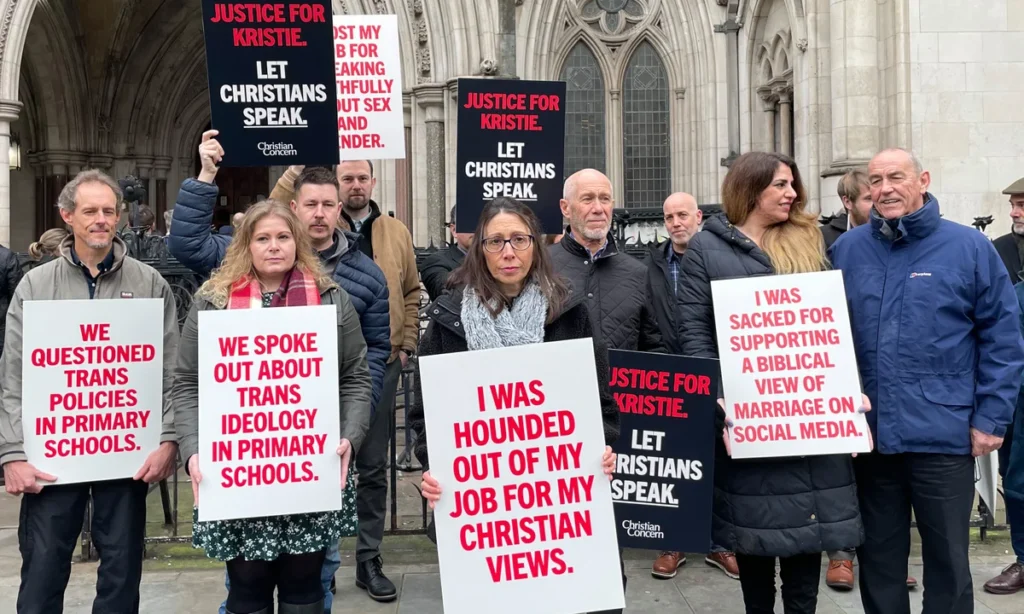Christian Worker Triumphs in Landmark Case Against School Over Dismissal for LGBT Posts

Christian worker gains final victory against school after it sacked her for LGBT posts
Introduction to the Case
The case involving a Christian worker’s dismissal from a school due to her social media posts concerning LGBT issues has garnered significant attention and raises important questions about freedom of expression and employment rights. The individual at the center of this matter, who served as a teacher for several years, faced termination after the school administration discovered a series of posts on her personal social media accounts. These posts expressed her religious beliefs related to LGBT topics, which the school deemed incompatible with its inclusive policies.
Initially, the posts were viewed by the school community through varying lenses. Some supporters asserted that the teacher was exercising her First Amendment rights, advocating for her personal beliefs and values. In contrast, opponents argued that her statements contradicted the institution’s commitment to creating a welcoming environment for all students, regardless of their sexual orientation. The contrasting views highlighted the ongoing debate surrounding the intersection of religious beliefs and LGBTQ+ rights within educational settings.
As news of her dismissal spread, it spurred reactions from various segments of the community. Some alumni and parents rallied behind the teacher, expressing discontent over what they perceived as an infringement on her rights. Conversely, advocacy groups for LGBT rights commended the school’s decision, emphasizing the need for safe and supportive spaces for all students. This case illustrates the complexities involved when personal beliefs clash with institutional policies, prompting discussions on the implications for educators and the broader community.
Ultimately, the outcome of this landmark case could set precedents that shape workplace rights concerning personal beliefs and the obligations of educational institutions to uphold inclusivity, making it a significant event in the continuing discourse on these pressing social issues.
The Dismissal: Circumstances and Reactions
The dismissal of a Christian worker from the school has sparked significant conversation and controversy. The administration cited the worker’s social media posts regarding LGBT issues as the primary reason for the termination. These posts, which were interpreted as contrary to the school’s values and mission, prompted officials to take action. The institution’s official stance was rooted in their interpretation of religious principles, leading to the belief that the worker’s online expression conflicted with the school’s foundational ethos.
The communication of the dismissal to the worker was reportedly abrupt. The administration opted for a formal meeting in which the decision was articulated without prior warning. This lack of transparency raised concerns among the worker’s colleagues and community supporters, who felt blindsided by the unilateral nature of the decision. Many questioned whether due process had been followed during this dismissal, noting that there seemed to be little room for dialogue or understanding regarding the worker’s viewpoints.
The reactions to the dismissal were swift and varied. Advocacy groups dedicated to LGBTQ+ rights condemned the decision, labeling it an act of discrimination cloaked in religious justification. They emphasized that such actions contribute to a hostile environment for individuals expressing their beliefs. Meanwhile, members of the community rallied in support of the worker, arguing for the need to foster an inclusive environment in educational institutions. The incident became a focal point for broader discussions about the intersection of religious beliefs and the rights of LGBTQ+ individuals, highlighting the ongoing dilemmas faced by organizations grappling with these complex issues.
Understanding Employment Law in Context
Employment law encompasses a broad array of regulations and concepts designed to protect both employees and employers within the workplace. One critical area of this framework is the rights of employees concerning discrimination, particularly in cases where an employee’s beliefs, including religious convictions, come into conflict with organizational policies or social movements. In the case of a Christian worker dismissed for posting content related to LGBT issues, several legal principles warrant discussion, notably, anti-discrimination laws, freedom of speech, and the rights of individuals to express their beliefs.
Anti-discrimination laws prohibit unfair treatment in the workplace based on a variety of protected characteristics, including religion. Employees have the right to approach their work environment without facing repercussions for their beliefs, provided those beliefs do not incite violence or constitute hate speech. Therefore, if an employee’s faith-based content was deemed inappropriate, it raises important questions about whether the dismissal was genuinely about professional conduct or a veiled attempt to suppress religious expression.
Additionally, freedom of speech plays a vital role in employment law, particularly regarding an employee’s right to express their opinions and beliefs outside work premises. The degree to which an employer can regulate this expression is often a complex legal question, compounded by factors such as the nature of the employment contract and any existing policies regarding social media use. In cases involving public versus private-sector employment, the legal safeguards afforded to employees may differ significantly.
Ultimately, navigating the intricacies of employment law requires a comprehensive understanding of these foundational concepts. Without a clear grasp of discrimination norms and the protections surrounding free expression, it becomes challenging to assess the legality of termination decisions in contexts like this landmark case.
The Worker’s Response: Legal Action Taken
Following her dismissal, the Christian worker made a determined decision to seek justice through legal action. Her response was meticulously planned, beginning with the collection of evidence to support her case. Recognizing the importance of documentation, she diligently gathered any relevant emails, correspondence, and social media posts that illustrated her commitment to her faith and the principles she upheld. This evidence served as essential support for her claims regarding the circumstances surrounding her termination.
Understanding the complexity and nuances of employment law, the worker sought out legal counsel specializing in cases related to wrongful dismissal and discrimination. This strategic move was critical as it allowed her to navigate the legal landscape more effectively. Her attorney assisted in evaluating the strength of her case, identifying potential legal pathways, and crafting a comprehensive strategy for her appeal. The legal counsel provided invaluable guidance and ensured that her fight for justice was grounded in robust legal frameworks.
Once equipped with her documentation and legal representation, the worker proceeded to file a formal complaint against the school. This process involved submitting detailed statements outlining her experiences, perceived injustices, and the impact of her dismissal on her personal and professional life. The filing of the complaint not only served as a formal response to her termination but also as a recorded assertion of her rights as an employee. Through these steps, the worker demonstrated her resilience and commitment to advocating for her beliefs, making it clear that she would not stand idly by in the face of discrimination based on her religious views.
Community Support and Advocacy
The case surrounding the dismissal of a Christian worker from her position at a school due to her posts on LGBT issues has highlighted the crucial role of community support and advocacy organizations. Local and national groups swiftly mobilized to stand behind the worker, demonstrating the power and influence of collective action in such sensitive matters. These organizations not only raised awareness about her situation but also fostered an environment of solidarity and compassion among various stakeholders.
Petitions were organized, gathering thousands of signatures that symbolized widespread support for the dismissed worker. These efforts were pivotal in drawing attention to the broader implications of the case, which raised critical questions concerning freedom of speech, religious beliefs, and LGBTQ+ rights. Advocacy groups engaged in grassroots campaigns, disseminating information through community forums and local events, further amplifying the voice of the worker whose career was jeopardized. Their commitment to transparency and justice served to educate the public on the complexities of such issues, enhancing community understanding and involvement.
Additionally, social media played an instrumental role in the movement. Platforms like Twitter, Facebook, and Instagram allowed supporters to share updates, express solidarity, and rally for justice on a larger scale. Hashtags created around the case quickly gained traction, transforming the worker’s story into a national discussion topic and engaging individuals who may not have been directly affected but sympathized with her situation. This digital advocacy not only spread awareness but also fostered a sense of urgency among supporters, encouraging them to take action and demand accountability.
In summary, the mobilization of community support and advocacy organizations significantly contributed to raising awareness and solidarity in this case, showcasing the importance of collective action in addressing complex social issues.
The Court’s Findings and Rulings
The court proceedings surrounding the case of the Christian worker dismissed for comments regarding LGBT issues were intricate and multifaceted, with both sides presenting compelling arguments. The plaintiff contended that his dismissal was a violation of his rights to free expression, asserting that his social media posts were not indicative of any misconduct in the workplace, but rather a reflection of his personal beliefs. He argued that his views were firmly rooted in his religious convictions, which should be protected under constitutional provisions that safeguard free speech.
Conversely, the school district maintained that the worker’s public comments could have contributed to a hostile environment for students and staff, particularly for those identifying as part of the LGBT community. They referenced various legal precedents, including cases that delineate employer rights to manage workplace culture and environment. The defense framed the termination as a necessary measure to uphold the institution’s values of inclusivity and respect for all students, suggesting that the worker’s statements contradicted the ethos of the educational institution.
In the court’s ruling, emphasis was placed on the balance between the rights of individual expression and the responsibilities of employers to maintain an inclusive work environment. The court cited landmark cases that navigated similar themes, affirming that while free speech is an essential right, it is not absolute in the context of employment when it potentially undermines the objectives of an organization dedicated to education and support of diverse student populations.
The court ultimately found in favor of the plaintiff, noting that the dismissal was not justifiable based on the presented evidence. This decision underscored the complexities surrounding the intersection of religious beliefs, free speech, and employment rights, setting a significant precedent for future cases involving similar conflicts. This ruling has broader implications for discussions around workplace rights, religious expression, and the protection of marginalized communities within educational settings.
Implications of the Verdict
The recent court ruling in favor of the Christian worker who faced dismissal based on social media posts related to LGBT issues has significant implications for various stakeholders within the education sector. This landmark decision not only establishes a precedent for how public schools handle similar employee conduct cases but also underscores the delicate balance between personal expression and institutional policies. As educational institutions grapple with evolving societal norms, this verdict may compel them to reassess their current policies regarding employee engagement on social media platforms.
One immediate effect of the ruling may be the introduction of more clearly defined guidelines surrounding teachers’ use of social media. Schools might feel pressured to implement a framework that protects employees’ rights to express their beliefs while simultaneously navigating the complexities of inclusivity and diversity. This verdict could signal to educational administrators that failing to respect an employee’s religious convictions may lead to legal repercussions, thus prompting a reformulation of social media guidelines to ensure they are compliant with legal standards.
Moreover, the case highlights the potential for similar disputes to arise in the future, particularly as schools aim to cultivate an environment embracing diverse viewpoints. The ruling could embolden religious employees to assert their rights in similar contexts, thereby influencing policies around employee conduct and speech within educational institutions. Such developments are likely to trigger discussions regarding the scope of permissible discourse in educational settings, especially around controversial topics such as gender identity and sexual orientation. Thus, the implications of this verdict extend beyond mere policy adjustments; they may also resonate throughout the landscape of educational law and employees’ rights, prompting ongoing debates about freedom of expression in academic environments.
Reflections from the Christian Community
The recent case involving a Christian worker who successfully navigated a dismissal challenge due to their posts on LGBTQ+ topics has sparked significant discourse within the Christian community. Various members, including church leaders and congregants, have expressed their thoughts on the implications of this landmark verdict for religious expression in professional environments. Many see this case as pivotal in addressing the conflicts that can arise when personal faith intersects with contemporary societal issues, notably regarding LGBTQ+ rights.
Pastors from diverse denominations have highlighted the need for a healthy dialogue between traditional Christian teachings and the realities of modern society. They assert that the outcome of this case reaffirms the importance of religious convictions in the workplace, allowing individuals to express their beliefs without fear of retribution. These leaders advocate for a balanced approach that respects both the rights of LGBTQ+ individuals and the freedom of religious expression. They argue that open conversations could foster understanding and mutual respect among differing perspectives.
Congregants have also shared their reflections, with some expressing relief over this ruling, viewing it as a victory not just for the specific individual but for others in the community who may feel their rights to express their beliefs are under threat. Others, however, urge caution, cautioning against the potential for divisive rhetoric that can emerge from this discussion. They emphasize the necessity for compassion and sensitivity when discussing faith in relation to LGBTQ+ issues, reinforcing that Christianity calls for love and acceptance.
Overall, this case has encouraged a broader examination of the relationship between faith and modern societal values, prompting myriad reflections on how Christian communities navigate these complex issues. The dialogue it has initiated is crucial, potentially leading to greater understanding and inclusivity within both faith-based and secular environments.
Conclusion: A Call for Dialogue
The recent landmark case involving a Christian worker who was dismissed from a school due to social media posts concerning LGBT issues serves as a poignant reminder of the complex interplay between religious beliefs and workplace policies. As various communities navigate the landscape of diversity and inclusion, this case highlights the urgent need for open dialogue that allows for multiple perspectives to be heard and understood. In educational environments, where the synthesis of various belief systems is particularly pronounced, fostering conversations that bridge gaps among differing views is essential.
This case underscores the principle that workplaces, especially those in educational settings, must strive for an atmosphere of mutual respect and understanding. The balancing act between upholding religious convictions and ensuring that all individuals feel welcome and safe cannot be underestimated. As institutions seek to foster inclusivity, it is crucial to recognize that religious freedoms and anti-discrimination standards are not inherently incompatible. A thoughtful approach to these discussions can yield a more harmonious environment, where all parties can coexist while maintaining their core beliefs.
Moreover, it is important for educational institutions to engage in proactive measures that emphasize dialogue over divisiveness. Workshops, open forums, and collaborative discussions can facilitate understanding among diverse groups. The case serves as a valuable impetus for developing strategies that respect both the rights of religious individuals and the rights of LGBTQ+ individuals. Only through continuous dialogue can communities find solutions that acknowledge and celebrate diversity while protecting individual freedoms. Cultivating this dialogue will ultimately strengthen the educational environment, making it a more inclusive space for all stakeholders.









